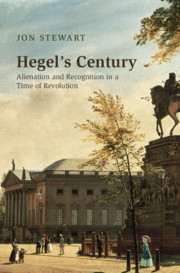Book contents
- Hegel’s Century
- Hegel’s Century
- Copyright page
- Dedication
- Contents
- Acknowledgments
- Preface
- Introduction
- Part I The Beginning
- Part II The First Generation
- Part III The Second Generation
- 6 Marx’s View of Religious and Political Liberation
- 7 Kierkegaard’s Analysis of the Forms of Despair and Alienation
- 8 Dostoevsky’s Criticism of Modern Rationalism and Materialism
- 9 Bakunin’s Theory of Anarchy
- 10 Engels’ Criticism of Feuerbach and Classical German Philosophy
- 11 Hegel’s Long Shadow in the History of Nineteenth-Century Philosophy
- Bibliography
- Index of Names
- Subject Index
7 - Kierkegaard’s Analysis of the Forms of Despair and Alienation
from Part III - The Second Generation
Published online by Cambridge University Press: 14 October 2021
- Hegel’s Century
- Hegel’s Century
- Copyright page
- Dedication
- Contents
- Acknowledgments
- Preface
- Introduction
- Part I The Beginning
- Part II The First Generation
- Part III The Second Generation
- 6 Marx’s View of Religious and Political Liberation
- 7 Kierkegaard’s Analysis of the Forms of Despair and Alienation
- 8 Dostoevsky’s Criticism of Modern Rationalism and Materialism
- 9 Bakunin’s Theory of Anarchy
- 10 Engels’ Criticism of Feuerbach and Classical German Philosophy
- 11 Hegel’s Long Shadow in the History of Nineteenth-Century Philosophy
- Bibliography
- Index of Names
- Subject Index
Summary
Chapter 7 explores the thought of the Danish philosopher and writer Søren Kierkegaard. It gives a close reading of the chapter “The Unhappiest One” from the first part of Either/Or. Kierkegaard brings up Hegel’s idea of the unhappy consciousness for comparison, thus signaling the importance of the concept of religious alienation. A discussion is also given of Kierkegaard’s critical assessment of his own age in his work A Literary Review of Two Ages, which was published on the eve of the Revolutions of 1848. Finally there is an analysis of Kierkegaard’s account of the nature of the alienated human being in The Sickness unto Death. An overview is given of his system of the forms of despair of which humans are victims. The chapter concludes with a comparison of the concept of alienation in Kierkegaard and Hegel.
- Type
- Chapter
- Information
- Hegel's CenturyAlienation and Recognition in a Time of Revolution, pp. 179 - 204Publisher: Cambridge University PressPrint publication year: 2021



